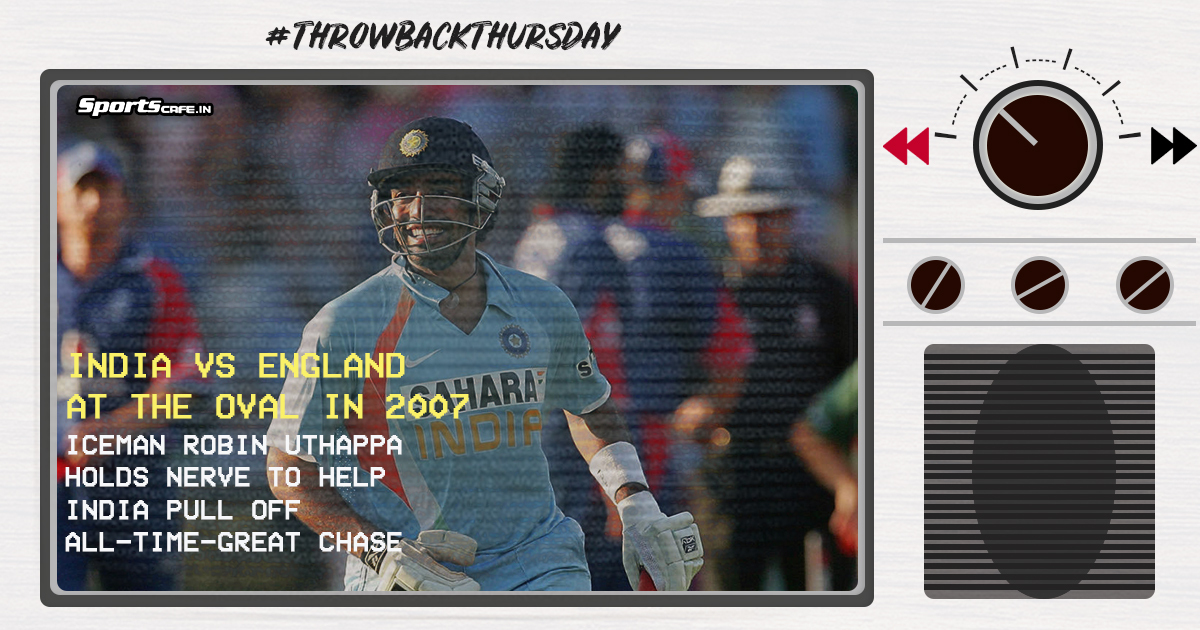Throwback Thursday | Iceman Robin Uthappa holds nerve to help India pull off all-time-great chase

Uthappa helped India pull off an all-time-great heist
|SportsCafe
Welcome to the series where we present you a moment, a game in history that has shaped the way the sport has been played, in our weekly segment ‘Throwback Thursday.' This week, we revisit India’s historic win at The Oval in 2007, a chase that is widely regarded as one of the greatest of all time.
It’s September 5, 2007, and we are at the ever-so-seraphic Oval in England, where India and England are playing the penultimate game of their seven-match ODI series. With Twilight approaching, 75% of the ground is filled with shade but in the spotlight, literally, are two 21-year-olds preparing to clash head-on one more time in an attempt to put an end to a see-saw battle that is evenly poised, still, with only 0.5% of the game left to be played. “India 313/8: Need 4 to win from 3 balls” reads the scorecard and it all comes down to these last 3 deliveries. One of these two sides, within the next minute, will be in their haunches and there is going to be absolute pandemonium in the stadium regardless of who ends up winning.
But before we see which of these two teams will exit The Oval with a bright smile, it is important to understand why this moment is significant, and how we got here in the first place.
As far as ‘dark years’ are concerned, the year 2007 was pitch black for both England and India. While England, on the very first week of the year, surrendered the Ashes 5-0 after being humiliated, thrashed and embarrassed on Australian soil, India, meanwhile, to the absolute shock of a billion people, crashed out of the very first round of the 2007 World Cup, four years after reaching the final of the tournament.
Two heavyweight cricketing nations that not too long ago - threatened to challenge the Aussie monopoly suddenly saw themselves lose direction, despite both countries having an influx of world-class young talent coming through whilst also boasting of multiple seniors at the absolute peak of their powers. So when India toured England in mid-2007, it was essentially two wounded nations, trying to slowly but steadily put behind nightmares of the recent past by aiming to build a new beginning, taking on each other.
The three-month-long tour kicked off with the Test matches and after escaping defeat in the first Test at Lord’s - largely thanks to divine rain intervention - India, led by Rahul Dravid, staged an astonishing upset to pocket the series 1-0. It was a result that not many saw coming as apart from India not having won in England in three decades, the Three Lions had only lost a solitary series - versus Steve Waugh’s Australia - in their own backyard in the entire century.
The fallout of the Test series defeat was bad for England, who were ripped to shreds by their media, but what it did, however, was give incentive for the hosts to win the limited-overs leg of the tour. India being a prime-time draw meant that the two countries had scheduled a seven-match ODI series and so, to salvage pride and avoid being blanked and humiliated in their own backyard, England, led by Paul Collingwood, were keen to display character and give a befitting reply in the 50-over leg of the tour.
And in the very first game of the series, England played like a side with a point to prove; they came out all guns blazing. Led by tons from Alastair Cook and Ian Bell, England posted a daunting 288 on the board before brutalizing India with the ball to register a 104-run victory and go 1-0 up in the series. The tables turned in the second game, where India edged the hosts by 9 runs, but Collingwood’s men managed to win 2 of the next 3 games in the series to 3-2 up in the series. And so England headed into the sixth and penultimate ODI at the Oval with a chance to put the series to bed.
Four of the first five ODIs in the series were won by the team batting first, hence the toss seemed crucial, and Collingwood made no mistake in calling it right as he, without hesitation, opted to bat first. However, for a brief while, it looked like the England skipper had made the wrong call.
Needing a win to seal the series, the hosts got off to a nightmare of a start, losing Cook in the very second ball of the game and then his partner, Matt Prior, two overs later. Pietersen and Bell then steadied the ship, but two disastrous mix-ups in the span of 78 balls meant that England were soon reduced to 137/5, threatening to put a below-par total on the board.
But the wounded hosts were not going to go away so easily. Across each of the first five ODIs, England had new and different heroes put their hands up at the right time and this time around, it was to be the turn of Owais Shah. Entering the game with scores of 19, 8 and 15 under his belt, Shah was under considerable pressure to deliver, but unperturbed by the situation of the match and the series, the phlegmatic right-hander used all seven years of his international experience to play the best knock of his career - an unbeaten 107, off just 95 balls.
However, by the time the English innings came to an end, it was not Owais Shah the world was talking about. In just 15 balls, Dimitri Mascarenhas had ended up eclipsing not just Shah’s maiden ODI century, but his entire cricketing career. In an onslaught that was only second to Herschelle Gibbs’ exhibition of six sixes early in the year, Mascarenhas pummelled poor Yuvraj Singh for five consecutive sixes in the final over to take England’s total to 316/6. If Shah’s knock had swung the momentum in England’s favour, Mascarenhas’ onslaught had deflated, demoralized and destroyed India - or at least the hosts thought so.
So, with the series on the line, 317 was the magic number for the Men in Blue to enforce a decider.
Late momentum swings in the first innings generally tend to affect chasing sides, but India, however, were having none of it. Turning the clock back, the evergreen duo of Sachin Tendulkar and Sourav Ganguly put up an opening partnership for the ages. The cuts, the pulls, the cover-drives, the lofted straight-drives, the dinks, the dabs - everything was out. For 22 overs, the English bowlers and fielders stood at The Oval helpless and in the blink of an eye, India had raced off to 150/0; suddenly, the target of 317 seemed 100 fewer than what it was.
But then came the twist. Both the openers perished in the span of 6 runs and England were, suddenly, seemingly out of nowhere, back in the game. 150/0 became 156/2 and, after a decent rebuild job, Mascarenhas punished India for the second time in the day as he struck twice to reduce the visitors to 234/5. So, once again, at least it felt, everything came down to MS Dhoni.
Expectedly, the next 45 minutes turned out to be about one man, and one man only. The ‘one man’, though, did not turn out to be MS Dhoni. Dhoni, after threatening to take the game away from England, perished for 35. But the chase was never about Dhoni. All that stood between England and a series win was an unfazed, tranquil, self-assured and cool-headed 21-year-old whose name read 'Robin Uthappa'.
Uthappa, prior to the game, had batted only 10 times in ODIs, and never once was outside the Top 3; the sixth ODI, in fact, was his first of the series. Yet here, the youngster batted like a seasoned pro who simply did not know what the word ‘pressure’ stood for. Walking in with the side needing 82 off 9 overs, he dispatched just the fourth ball he faced to the boundary, and took charge of the chase from thereon, remaining unflustered by the occasion. Still, when Dhoni perished, leaving India to get 23 off 12 balls with just three wickets remaining, the overarching feel was that, along with the wicket-keeper batsman, the game, too, had slipped away. With an over each left for Anderson and Broad, not many laid their faith on the youngster to take the side home.
But Uthappa was taking no prisoners. He was not there to settle for second best; he had a solitary goal in mind, which was to take his side over the line. Hogging the strike, with Agarkar at the other end, he took 13 off the penultimate Anderson over, before returning to strike - albeit unintentionally - for the final over. With 10 required off the last over, the first two balls yielded just two runs, but Uthappa did not panic. A full-toss from Broad on the third ball was dispatched to the fine-leg boundary and, suddenly, the Indian fans hoped again. The Men in Blue were one hit away from pulling off quite a remarkable chase, and, essentially, one ball away from enforcing a decider.
So that brings us to the moment.
The tension is building and the hysteria in the ground has reached a crescendo. Broad takes a deep breath, gets to his mark and prepares himself to take off, while Uthappa, as if he’s been in this situation a dozen times before, taps his bat gently into the wicket and firmly fixes his eyes on the hands of the bowler. One swing of Uthappa’s willow will see India not just script one of the greatest wins in their history but take the series to a decider, while a series of yorkers from Broad will help England avenge the defeat they endured in the longest format less than a month ago. For India, at stake is the series, and for England, their pride. Three balls to go and two players in the hot-seat, of which one could endure a career-defining, life-turning moment. This is it.
Welcome to a moment in history
